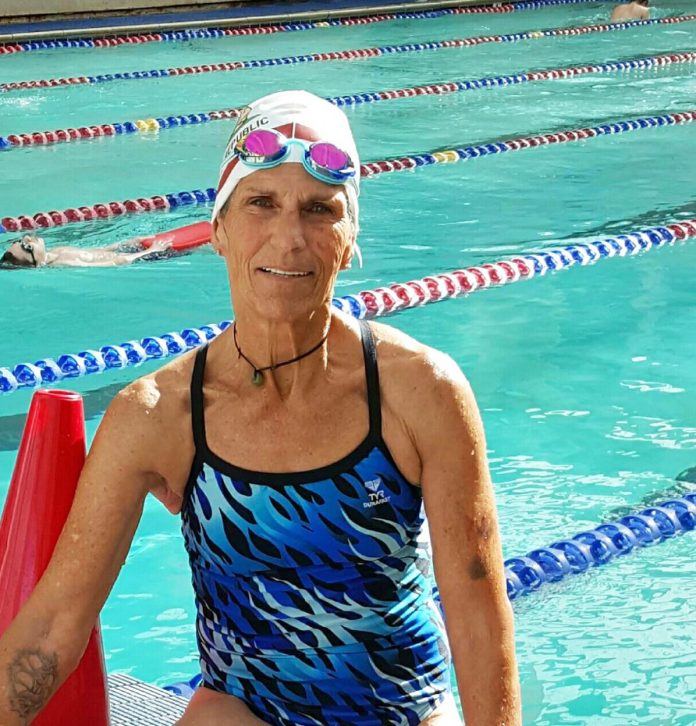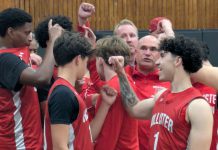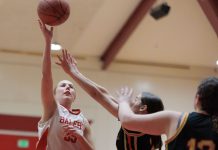
Pati Hughes-Fudge can’t imagine the emotions she would feel if she ever got to meet her donor’s family. All Hughes-Fudge knows is the liver that saved her life—she underwent liver transplant surgery last September after being on the waiting list for six years—came from a 14-year-old boy.
“I wrote my letter (to the family) within a month of having surgery because it took me a month to find the words to partially describe what it meant,” said Hughes-Fudge, a Tres Pinos resident who estimated she had two months to live had she not received the transplant. “You just have to wait and bide your time. I figure they were generous and caring enough to do what they did, and hopefully they’ll be able to see their way in some sort of time.”
On Wednesday, the 64-year-old Hughes-Fudge finished up competing in the Donate Life Transplant Games of America in Cleveland. Hughes-Fudge earned a silver medal as part of the 4×400 women’s relay, along with a pair of bronzes in the 100-yard dash and 50-meter breaststroke competing in the 60 to 69-year-old age division.
The Donate Life Transplant Games is a festival style multi-sport event for participants who have either undergone life¬saving transplant surgeries or are living donors.
“In a situation like this, you really can’t lose,” she said. “I really want to honor my donor family. I wish I could know them so they could be here and at least know I’m competing. For the time being, I’m not out here to win gold and stand on the medal block—I just want to celebrate life.”
Eight months ago, Hughes-Fudge had a hard time getting out of the house on her own power. Six months ago, Hughes-Fudge couldn’t swim at all. And as recently as three months ago, Hughes-Fudge couldn’t swim 25 meters without getting gassed. But ever since Hughes-Fudge underwent the liver transplant, it’s as if she’s been born again.
“So I figure anything I do here this week is a win-win and a celebration,” she said.
Out of all her athletic achievements at the Games, Hughes-Fudge said being a part of the 4×400 relay team was the biggest and most rewarding highlight.
“The 4×400 was my favorite because I didn’t think I could run 400 meters,” she said. “I took on the 100-yard dash knowing I could do it, but hoping I wouldn’t fall down or trip at some point. But the 400 was going to be a huge challenge. I amazed myself because I ran the whole way.”
Even though winning the medals was a huge honor, it was merely a bonus. The real joy of the Donate Life Transplant Games features highlighting the critical importance of organ, eye and tissue donation, while celebrating the lives of donors and recipients.
Hughes-Fudge couldn’t help but be in tears throughout her stay in Cleveland as she had so many poignant conversations with people she had never met before.
“Hearing their stories about loved ones who’ve passed on, you’re in tears all the time,” she said.
Hughes-Fudge’s greatest accomplishment centers around the fact that she’s still alive today. In 2010 and 2014, Hughes-Fudge nearly bled out to death, having lost significant units of blood each time. Hughes-Fudge contracted the Hepatitis-C virus after undergoing a blood transfusion 40 years ago following the birth of her son, Cody.
However, Hughes-Fudge wasn’t diagnosed with Hepatitis-C—which causes chronic liver disease—until 2000. That meant she spent 34 years living with a condition that in some cases causes nausea, fatigue, loss of appetite and yellowing of the eyes and skin.
Hughes-Fudge said that people with liver disease can develop polyps in the esophagus because of pressure in the blood, which can eventually rupture, go completely vascular and cause severe bleeding. Hughes-Fudge had two severe episodes, the first in 2010 and the second in 2014 in which she said doctors had to replace five to six units of blood.
That’s a lot for anyone, let alone Fudge-Hughes, who is 5-foot and 100 pounds. Hughes-Fudge spent several decades working in the horse industry. She was a jockey, horse judge, horse trainer and worked at various ranches across the country. She was immersed in the lifestyle, working seven days a week, 10 to 12 hours each day.
On a whim, Hughes-Fudge could take off on a flight to New Zealand to judge a horse show. Hughes-Fudge enjoyed working, and that grind-it-out mindset proved to serve Hughes-Fudge well throughout her various health scares and near-death experiences.
“I’ve always had a positive outlook on life,” she said. “I never let anything get me down because I feel it would be a sign of weakness. God forbid my father would not put up with weakness.”
Once potential organ donation recipients are put on a waiting list, the chances of undergoing a transplant are slim. When it comes to the liver, the donor and recipient must be matched by body size and blood type. Hughes-Fudge was put on a waiting list in 2010 because she had end-stage liver disease.
She also developed cancer two years ago, which was removed after the transplant. Getting the transplant was an arduous process, as Hughes-Fudge was rebuffed four or five times before everything worked out. In one instance, Hughes-Fudge received a call only to later find out that the donor’s liver was compromised.
In another instance, a better match was found, so Hughes-Fudge was back on the wait list. Hughes-Fudge knew her liver was in bad shape—she just didn’t know how grim the situation was. After Hughes-Fudge had the transplant, her daughter, Kelly King, wanted to see her mom’s liver.
“We made arrangements with the hospital and the pathology department to go down and see it,” she said. “The lab tech said she had never seen a liver this bad come out of a living patient.”
Hughes-Fudge started working six years ago with Donor Network West, which has been a tremendous support system and “unbelievable in what they’ve done for me psychologically and physically.” Hughes-Fudge can’t help but want to return a small token of her gratitude by sharing with the public on the importance of organ donation.
According to Donor Network West, one organ donor can save the lives of up to eight people and an eye and tissue donor can heal more than 50 others. Anyone can register as a donor at DonorNetworkWest.org or at a DMV (Hughes-Fudge serves as an ambassador to the Hollister DMV to help with donor registrations).
Hughes-Fudge knows the sacrifice and generosity it takes for a family to donate their kids’ organs. Her donor turned out to be a special case in that the liver actually saved two lives—Hughes-Fudge’s and another infant.
“They took a small portion of liver they gave me and gave it to a baby,” she said. “It was a split liver transplant. They said this one liver saved two lives. You think of the joy for the parent of the young baby that otherwise would have died and was saved because they were at the right place at the right time. If it wasn’t for the donor, the recipient would not be here. We literally have our total lives to thank them for.”
Through a series of calls with the Free Lance, Hughes-Fudge broke down a couple of times when it came time to talking about her donor’s family. How incredible it would be if she could meet them one day. And what she would say. The thought of that got her emotional.
If there is anything that captures the essence of the life Hughes-Fudge now lives, it’s this: on Tuesday, she started to run away from a bus so she could carry on a conversation with a reporter over the phone. In a flash, Hughes-Fudge expressed gratitude that because of the transplant, she could run again.
Hughes-Fudge once gasped for air. The breaths come easier now.









